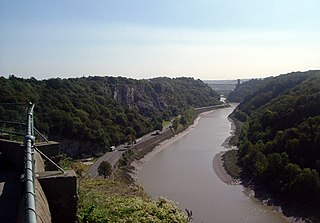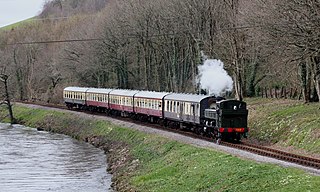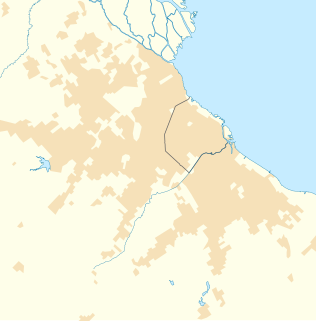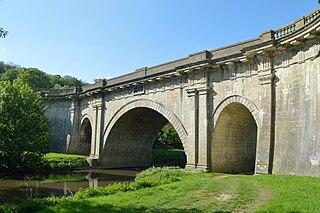
The River Severn, at 220 miles (354 km) long, is the longest river in Great Britain. It is also the river with the most voluminous flow of water by far in all of England and Wales, discharging an average of 107 m3/s (3,800 cu ft/s) into the Bristol Channel at Apperley, Gloucestershire. It rises in the Cambrian Mountains in mid Wales, at an altitude of 2,001 feet (610 m), on the Plynlimon massif, which lies close to the Ceredigion/Powys border near Llanidloes. The river then flows through Shropshire, Worcestershire and Gloucestershire. The county towns of Shrewsbury, Gloucester and the City of Worcester lie on its course.

The River Avon is an English river in the south west of the country. To distinguish it from a number of other rivers of the same name, this river is often also known as the Bristol Avon. The name ‘Avon’ is a cognate of the Welsh word afon, ‘river’.

The Kennet and Avon Canal is a waterway in southern England with an overall length of 87 miles (140 km), made up of two lengths of navigable river linked by a canal. The name is used to refer to the entire length of the navigation rather than solely to the central canal section. From Bristol to Bath the waterway follows the natural course of the River Avon before the canal links it to the River Kennet at Newbury, and from there to Reading on the River Thames. In all, the waterway incorporates 105 locks.

Bath and North East Somerset is the district of the unitary authority of Bath and North East Somerset Council that was created on 1 April 1996 following the abolition of the county of Avon. It is part of the ceremonial county of Somerset.

Barking is a district of East London and the administrative centre of the London Borough of Barking and Dagenham, with a population of 59,068. It is 9.3 miles (15 km) east of Charing Cross. It was historically an ancient parish in the county of Essex that straddled the River Roding. It underwent a shift from fishing and farming to market gardening and industrial development on the River Thames. Barking railway station opened in 1854 and has been served by the London Underground since 1908. As part of the suburban growth of London in the 20th century, Barking significantly expanded and increased in population, primarily due to the development of the London County Council estate at Becontree in the 1920s, and became a municipal borough in 1931, and part of Greater London in 1965. In addition to an extensive and fairly low-density residential area, the town centre forms a large retail and commercial district, currently a focus for regeneration. The former industrial lands to the south are being redeveloped as Barking Riverside.

Cardiff Central railway station is a major station on the South Wales Main Line, located in the capital of Wales, Cardiff. It is one of the city's two urban rail network hubs, along with Cardiff Queen Street. Opened in 1850 as Cardiff station, it was renamed Cardiff General in 1924, and then Cardiff Central in 1973.

The Avon Valley Railway (AVR) is a three-mile-long heritage railway based at Bitton station in South Gloucestershire, England, not far from Bristol and is run by a local group: The Avon Valley Railway Company Ltd. The railway follows the Avon Valley south-east from Oldland Common, through Bitton and alongside the River Avon towards Kelston and Bath. The railway shares its route with the Sustrans cycleway and footpath, the Bristol & Bath Railway Path.

Brooklyn is a town in the state of New South Wales, Australia, in the local government area of Hornsby Shire with a population of 722 as of the 2016 census. Brooklyn is surrounded by the Muogamarra Nature Reserve and occupies a strip of waterfront along the southern bank of the Hawkesbury River.

The South Devon Railway is a 6.64 miles (10.69 km) heritage railway from Totnes to Buckfastleigh in Devon. Mostly running alongside the River Dart, it was initially known as the Dart Valley Railway. The railway is now operated by the South Devon Railway Trust, a registered charity.

The Tennessee Valley Railroad Museum is a railroad museum and heritage railroad in Chattanooga, Tennessee.

Windsor & Eton Riverside station is a station in Windsor, Berkshire, England. The station, close to the River Thames and Windsor Castle, is a Grade II listed building. It is 25 miles 48 chains (41.2 km) down the line from London Waterloo and is the terminus of the Staines to Windsor Line, served by South Western Railway.

The Conway Scenic Railroad is a heritage railroad in North Conway, New Hampshire, United States, owned by Profile Mountain Holdings Corp. The railroad operates over two historic railway routes: a line from North Conway to Conway that was formerly part of the Conway Branch of the Boston and Maine Railroad, and a line from North Conway through Crawford Notch to Fabyan that was once part of the Mountain Division of the Maine Central Railroad. The Conway line is owned by Conway Scenic, and the Mountain Division is owned by the State of New Hampshire.

Tigre is a city in the Buenos Aires Province, Argentina, situated in the north of Greater Buenos Aires, 28 km (17 mi) north of Buenos Aires city. Tigre lies on the Paraná Delta and is a tourist and weekend destination, reachable by bus and train services, including the scenic Tren de la Costa. It is the main city, seat of the Tigre Partido.

The Reading Blue Mountain and Northern Railroad, sometimes shortened to Reading and Northern Railroad, is a regional railroad operating in eastern Pennsylvania, with headquarters located in Port Clinton. The RBMN provides freight service on 300 miles (480 km) of track, with its mainline consisting of the Reading Division between Reading and Packerton and the Lehigh Division between Lehighton and Dupont. In addition to freight service, passenger excursions also run along the RBMN system. The Lehigh Gorge Scenic Railway (LGSR) is a tourist railroad that operates passenger excursions along the RBMN between Jim Thorpe and Lehigh Gorge State Park. The RBMN also operates passenger excursions from Reading and Port Clinton to Jim Thorpe.

Dundas Aqueduct carries the Kennet and Avon Canal over the River Avon and the Wessex Main Line railway from Bath to Westbury. The aqueduct is near Monkton Combe, Somerset, and is about 2 1⁄2 miles (4 km) southeast of the city of Bath.
The majority of public transport users in the Bristol Urban Area are transported by bus, although rail has experienced growth and does play an important part, particularly in peak hours. There were plans for a light rail system, however this has now been dropped although it remains in the long-term local transport plan.

Bitton railway station is the main station of the Avon Valley Railway. It is located near the village of Bitton, South Gloucestershire.

Cuyahoga Valley Scenic Railroad is a Class III railroad operating diesel-electric and steam-powered excursion trips through Peninsula, Ohio in the Cuyahoga Valley, primarily through the scenic Cuyahoga Valley National Park.

The New Cut is an artificial waterway which was constructed between 1804 and 1809 to divert the tidal river Avon through south and east Bristol, England. This was part of the process of constructing Bristol's Floating Harbour, under the supervision of engineer William Jessop. The cut runs from Totterdown Basin at the eastern end of St Phillip's Marsh, near Temple Meads, to the Underfall sluices at Rownham in Hotwells and rejoining the original course of the tidal Avon.


















